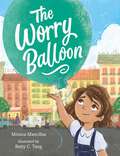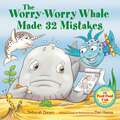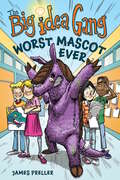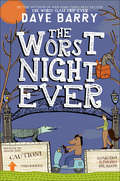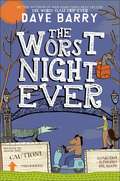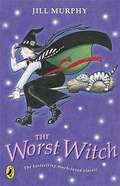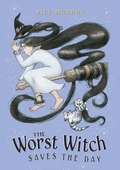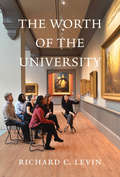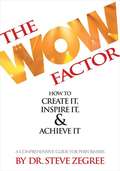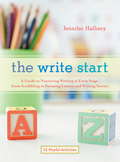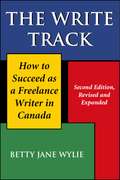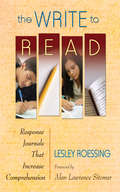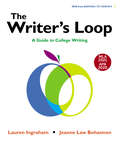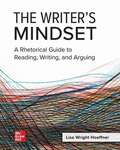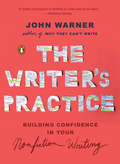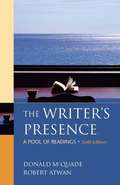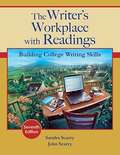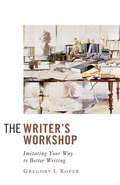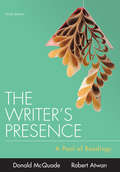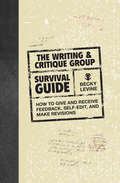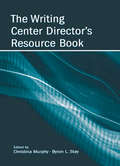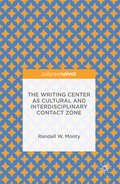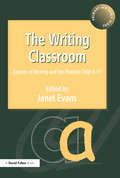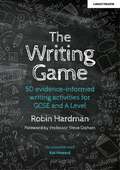- Table View
- List View
The Worry Balloon
by Mónica MancillasOn the first day of school, Isla’s mind plays the what if game. Scary thoughts come, the world goes dark, andeverything feels stormy. With Mami at her side, Isla takes a deep breath and blows her worries away in a big balloon. But as school gets closer, Isla’s worries come back like a tornado. Mami encourages her to imagine something happy, and Isla remembers there’s nothing she can’t handle.The storm might come again, but for now, her mind is quiet.In this thoughtful and reassuring picture book, Mónica Mancillas’s text and Betty C. Tang’s illustrations show how one child experiences anxiety and worry, providing different tools to practice mindfulness and strengthen one’s mental health.
The Worry-Worry Whale Made 32 Mistakes (A Worry-Worry Whale Adventure)
by Deborah DiesenTurn everyday worries into confidence! First introduced in The Pout-Pout Fish and the Worry-Worry Whale, Willa Whale is the star of her own spin-off series, inspired by the New York Times bestselling Pout-Pout Fish books.Willa is discouraged!She’s learning something new.She’s tried and tried, but no success:“I don’t know what to do!”She’s sure she'll never get it.“I’m missing what it takes!”But could it be a good thingTo make thirty-two mistakes?Swim along with Willa Whale as she explores the experience of trying, practicing, and making mistakes. She might just discover that everyone makes mistakes when they try new things—even grown-ups and the Pout-Pout Fish!—and that mistakes are an important part of learning and growing.There are more Pout-Pout Fish and Worry-Worry Whale books in the sea:The Pout-Pout FishThe Pout-Pout Fish In the Big-Big DeepThe Pout-Pout Fish Goes to SchoolThe Not Very Merry Pout-Pout FishThe Pout-Pout Fish, Far, Far From HomeThe Pout-Pout Fish and the Bully-Bully SharkThe Pout-Pout Fish and the Can’t-Sleep BluesThe Pout-Pout Fish Cleans Up the OceanThe Pout-Pout Fish and the Mad, Mad DayThe Pout-Pot Fish and the Worry-Worry WhaleThe Worry-Worry Whale and the Classroom JittersThe Worry-Worry Whale and the Halloween Scaries (Coming soon!)
The Worst Mascot Ever (The Big Idea Gang)
by James PrellerFour friends put their heads together to convince their school to get a new mascot in The Big Idea Gang—an exciting new chapter book series about making a case . . . and making a difference! Quick-thinking third-graders Lizzy, her twin, Connor, and their friends Kym and Deon have a big idea: their school desperately needs a new mascot, and they've got the perfect one in mind. Now they have to figure out a way to convince their principal and rally the rest of the school behind them. Luckily, their teacher, Miss Zips (short for Zipsokowski—but who can say that?) is skilled in the art of persuasion. Armed with Miss Zips's persuasive tips, the gang of four set out to make their claim, build a case for a new mascot, and convince Clay Elementary that Arnold the Armadillo has had his day.
The Worst Night Ever (Class Trip #2)
by Dave BarryLast year, Wyatt Palmer was the hero of middle school, having foiled a plot against the president of the United States. But now he and his friends are in Coral Cove High School -- home of the Fighting Conchs -- and Wyatt is no longer a hero: He's just another undersized freshman, hoping to fit in, or at least not be unpopular. Things start to go wrong when Matt Diaz, who is Wyatt's best friend but also unfortunately an idiot, decides to bring his pet ferret, Frank, to school. Through an unfortunate series of events Frank ends up in the hands of the Bevin brothers, who are the most popular boys at Coral Cove High, but are also, as Matt soon discovers, the nastiest. When Wyatt and Matt try to get Frank back, they concoct a plan to attend a party for the cool clique at the Bevin's waterfront mansion and stumble onto the Bevin family's dark and deadly secret. That's when Wyatt learns that some things are worse than being unpopular in high school. MUCH worse.
The Worst Night Ever (Class Trip Ser.)
by Dave Barry Grzegorz KrysinskiLast year, Wyatt Palmer was the hero of middle school, having foiled a plot against the president of the United States. But now he and his friends are in Coral Cove High School-home of the Fighting Conchs-and Wyatt is no longer a hero: He's just another undersized freshman, hoping to fit in, or at least not be unpopular. Things start to go wrong when Matt Diaz, who is Wyatt's best friend but also unfortunately an idiot, decides to bring his pet ferret, Frank, to school. Through an unfortunate series of events Frank ends up in the hands of the Bevin brothers, who are the most popular boys at Coral Cove High, but are also, as Matt soon discovers, the nastiest. When Wyatt and Matt try to get Frank back, they concoct a plan to attend a party for the cool clique at the Bevin's waterfront mansion and stumble onto the Bevin family's dark and deadly secret. That's when Wyatt learns that some things are worse than being unpopular in high school. MUCH worse.
The Worst Witch
by Jill MurphyMildred Hubble is the worst witch at Miss Cackle's Academy for Witches she's always getting her spells wrong. But she manages to get by until she turns Ethel, the teacher's pet, into her deadly enemy ISBN 978-0-14-131450-1
The Worst Witch Saves the Day
by Jill MurphyMildred is starting her third year at Miss Cackles Academy for Witches with high hopes of improving her klutzy record. A curling-iron catastrophe leads her to hair-raising results. She raises the ire of Miss Granite. Is there anything in Mildred's bag of tricks that can save the school?
The Worth of the University
by Richard C. LevinPublished on the occasion of Richard C. Levinâ TMs retirement as president of Yale University, this captivating collection of speeches and essays from the past decade reflects both his varied intellectual passions and his deep commitment to university life and leadership. Whether discussing the economic implications of climate change or speaking to an incoming class of Yale freshmen, he argues for the vital importance of scholarship and the critical role that universities play in educating students and promoting the overall well-being of our society.This collection is a sequel to The Work of the University, which contained the principal writings from Levinâ TMs first decade as Yaleâ TMs president, and it enunciates many of the same enduring themes: forging a strong partnership with the city of New Haven, rebuilding Yaleâ TMs physical infrastructure, strengthening science and engineering, and internationalizing the university. But this companion volume also captures the essence of university leadership. In addressing topics as varied as his personal sources of inspiration, the development of Asian universities, and the universityâ TMs role in promoting innovation and economic growth, Levin challenges the reader to be more engaged, more creative, more innovative, and above all, a better global citizen. Throughout, his commitment to and affection for Yale shines through.
The Wow Factor: A Comprehensive Guide for Performers
by Steve ZegreeDr. Steve Zegree of Western Michigan University, choral arranger and conductor of Western Michigan's Gold Company has developed this practical guide for performers, students, teachers and parents which offers fundamental philosophies and concepts that are essential to a person's growth and development and will contribute to a successful professional life in music.
The Write Start: A Guide to Nurturing Writing at Every Stage, from Scribbling to Forming Letters and Writing Stories
by Jennifer HallissyHow do you raise children who love to write? Jennifer Hallissy believes that if you give children a solid foundation of writing basics, they will develop a love of writing that lasts a lifetime. In this book, she shares the secrets for supporting young writers, from the smallest of scribblers to middle-schoolers mastering script. You play an important role in nurturing your child's writing development. You are your child's first writing teacher, and their most important writing role model. From teaching your child how to hold a pencil and form the letters of the alphabet, to creating writing spaces and meaningful writing rituals at home, this book gives you all of the information and inspiration you need to raise a confident writer. Fifty-two playful activities are presented as ways to invite your child to write. Each activity offers specific suggestions to meet the needs of Scribblers (pre-writers), Spellers (emerging writers), Storytellers (beginner writers), and Scholars (more experienced young writers)--providing the just-right combination of fun and functional skill development. The Write Start is a treasure trove of irresistible ideas that will help you introduce your child to the wonderful world of writing, now, and for years to come.
The Write Track: How to Succeed as a Freelance Writer in Canada Second Edition, Revised and Expanded
by Betty Jane WylieThe Write Track is a personal and practical look at the author’s freelance experience as she tells how she made it from uncertain early days to the growing confidence of a veteran. This guide is packed with the information a freelance writer needs to know, including: a writer’s self-evaluation profits from brainwaves details of the writing life and the writing business a writer’s rights and responsibilities and those important "first steps" into the freelance world If you want to make a living as a freelance writer in Canada, you need to read The Write Track.
The Write to Read: Response Journals That Increase Comprehension
by Lesley J. RoessingUse reader response strategies to help students build understanding of complex literary and informational text, and provide supporting evidence in their writing—all goals of the Common Core.
The Writer's Craft Green Level Grade 8
by Mcdougal LittellEducational book for grade 8 students. Contains writer's workshops with guided and related assignments, a writing handbook with mini-lessons in writing process, style, and academic skills; and a grammar and usage handbook with mini-lessons in grammar, usage, and mechanics.
The Writer's Loop with 2020 APA and 2021 MLA Updates
by Lauren Ingraham Jeanne BohannonThis ebook has been updated to provide you with the latest guidance on documenting sources in MLA style and follows the guidelines set forth in the MLA Handbook, 9th edition (April 2021).The Writer’s Loop, presents a refreshing, practical approach to writing, based on the habits of strong writers, who pause often, reflect, and loop backwards and forwards as they revise on their way to a final draft. With integrated videos, relatable examples, clear explanations, and a consistent, scaffolded learning framework, each brief chapter engages writers through reflection and practices that support the most common types of academic writing, including essays, arguments, and research projectsAchieve with Ingraham and Bohannon, The Writer’s Loop combines instruction with integrated videos, powerful writing tools, and customizable multi-draft writing assignments.
The Writer's Mindset: A Rhetorical Guide to Reading, Writing, and Arguing
by Lisa HoeffnerTo become good writers, students must learn more than a writing process: they must develop a writer’s mindset―the rhetorical skills to read critically, analyze and synthesize sources, and write with their audiences in mind. How can we help students with the challenges involved in thinking like a writer? By using incremental steps that move from literal thinking to analytical and critical understanding, The Writer’s Mindset 1e makes the development of college-level writing capabilities possible for all students, whatever their level of preparedness. <p><p> The Writer’s Mindset provides students with tools to transform the way they approach reading, writing, and arguing through five key pillars: <p> <p>• Rhetorical Focus <p>• Incremental Approach <p>• Embedded Support <p>• Student Appeal <p>• Instructor Support <p><p> The breadth of coverage allows the text to be used in both semesters of Composition, including Composition sections tied to a Co-Requisite or ALP course, which makes this an excellent choice for 2-year schools. It also includes MLA 9e updates. Target opportunities using Everyone’s an Author, Everything’s an Argument, or Writing in the Works.
The Writer's Practice: Building Confidence in Your Nonfiction Writing
by John WarnerFor anyone aiming to improve their skill as a writer, a revolutionary new approach to establishing robust writing practices inside and outside the classroomAfter a decade of teaching writing using the same methods he’d experienced as a student many years before, writer, editor, and educator John Warner realized he could do better. Drawing on his classroom experience and the most persuasive research in contemporary composition studies, he devised an innovative new framework: a step-by-step method that moves the student through a series of writing problems, an organic, bottom-up writing process that exposes and acculturates them to the ways writers work in the world. The time is right for this new and groundbreaking approach. The most popular books on composition take a formalistic view, utilizing “templates” in order to mimic the sorts of rhetorical moves academics make. While this is a valuable element of a writing education, there is room for something that speaks more broadly. The Writer’s Practice invites students and novice writers into an intellectually engaging, active learning process that prepares them for a wider range of academic and real-world writing and allows them to become invested and engaged in their own work.
The Writer's Presence: A Pool of Readings
by Donald Mcquade Robert AtwanThe readings in The Writer's Presence are selected exclusively for the quality of the writing. Editors Donald McQuade of the University of California, Berkeley, and Robert Atwan, Series Editor of The Best American Essays scoured hundreds of essays in search of teachable readings with strong voices and clear points of view. The result is a blend of classic pieces by favorites like James Baldwin, Annie Dillard, and Amy Tan; and fresh pieces by rising stars like Michael Pollan, Geeta Kothari, James McBride, and Daniel Harris. The voices in The Writer's Presence represent different communities, time periods, levels of difficulty, and fields of study, and the topics intersect in intriguing and nuanced ways, giving students the opportunity to think critically and develop their own voices. Organized by type of writing and with minimal apparatus, The Writer's Presence gives instructors unsurpassed teaching flexibility. With so many exceptional readings and so many ways to teach them, the possibilities are endless.
The Writer's Workplace with Readings: Building College Writing Skills (7th Edition)
by Sandra Scarry John ScarryFor more than 20 years, THE WRITER'S WORKPLACE has served the needs of more than half a million two- and four-year students as they have worked their way toward rewarding careers in a variety of fields. Sandra Scarry and John Scarry present writing instruction in a clear and inviting form, with step-by-step explanations to help build and maintain students' confidence in their writing. The result of many years of classroom teaching and research, this comprehensive and time-tested resource reflects the authors' understanding that students are unique individuals, with diverse backgrounds and interests that must be accounted for as they engage in the writing process.
The Writer's Workshop: Imitating Your Way to Better Writing
by Gregory L. RoperThe Writer's Workshop takes an approach to teaching writing that is new only because it is so old. Today, rhetoric and composition typically proceed by ignoring what was done for 2,500 years in Western education. Gregory Roper, on the other hand, helps students learn to write in the way the great writers of the past themselves learned: by carefully imitating masters of the craft, including Cicero, Thomas Aquinas, Charles Dickens, Sojourner Truth, James Joyce, and Ernest Hemingway. By living in their workshops and apprenticing to these and other masters, apprentice writers—like apprentice musicians, painters, and blacksmiths of the past—will rapidly improve the complexity of their art and discover their own native voices. Interspersed into chapters full of sound practical advice and challenging assignments are reflections on Great Ideas from "Realism and Impressionism" to "Nominalism and Modern Science." Perfect for the college or even high school writing classroom—as well as a marvelous book for homeschoolers and others who would like to improve their own writing—The Writer's Workshop is a fine practical guide, and Dr. Roper a friendly yet demanding teacher-mentor.
The Writer’s Presence
by Robert Atwan Donald McQuadeMemorable. Provocative. Timely. Luminous. The Writer's Presence brings together the best of the essay genre in a teachable, flexible compendium, because great reading inspires great academic writing. Edited by Best American Essays series editor Robert Atwan and composition teacher and scholar Donald McQuade, The Writer's Presence offers a rich pool of readings you'll enjoy dipping into. The essays here address topics students care about, from race in America to transgender identity, with careful attention to voice, tone, and figurative language. Classic authors like Langston Hughes and George Orwell join rising stars like Roxane Gay and Eula Biss for a grand tour of masterful writing. Divided into three parts--personal writing, expository writing, and argumentative writing--The Writer's Presence also provides practical strategies for student writers, giving them tools to sharpen their own voices and imagination. An e-book option offers even greater flexibility and convenience.
The Writing & Critique Group Survival Guide: How to Make Revisions, Self-Edit, and Give and Receive Feedback
by Becky LevineTrying to Finish Your Book? There's Strength in Numbers Whether you're trying to revise your novel or polish up an article to pitch to magazines, it pays to have a few sets of eyes look over your work. But, how can you be sure you're getting an unbiased and objective opinion? A writing critique group may be the answer you're looking for, and this book arms you with everything you need to find a group that suits your specific writing needs. Whether you're looking to join an existing group or start one of your own, you'll learn how to: Find compatible critique partners Develop your "editor's eye" and analyze writing like a professional Construct organized and well thought-out critiques Give and receive constructive feedback Run efficient critique meetings and maintain a good group dynamic Apply the feedback you receive to your own writing and make revisions Complete with worksheets, sample critiques and examples,The Writing & Critique Group Survival Guidegives you tools to hone your editing skills and deepen your understanding of how to revise your own work as well as someone else's. With the help of this guide your writing critique group can be a helpful resource for you and your writing partners for years to come.
The Writing Center Director's Resource Book
by Christina Murphy Byron L. StayThe Writing Center Director's Resource Book has been developed to serve as a guide to writing center professionals in carrying out their various roles, duties, and responsibilities. It is a resource for those whose jobs not only encompass a wide range of tasks but also require a broad knowledge of multiple issues.The volume provides information on the most significant areas of writing center work that writing center professionals--both new and seasoned--are likely to encounter. It is structured for use in diverse institutional settings, providing both current knowledge as well as case studies of specific settings that represent the types of challenges and possible outcomes writing center professionals may experience. This blend of theory with actual practice provides a multi-dimensional view of writing center work.In the end, this book serves not only as a resource but also as a guide to future directions for the writing center, which will continue to evolve in response to a myriad of new challenges that will lie ahead.
The Writing Center as Cultural and Interdisciplinary Contact Zone
by Randall W. MontyWriting centers are complex. They are places of scholarly work, spaces of interdisciplinary interaction, and programs of service, among other things. With this complexity in mind, this book theorizes writing center studies as a function of its own rhetorical and discursive practices. In other words, the things we do and make define who we are and what we value. Through a comprehensive methodological framework grounded in critical discourse analysis, this book takes a closer look at prominent writing center discourses by temporarily shifting attention away from the stakeholders, work, locations, and scholarship of the discipline, and onto things--the artifacts and networks that make up the discipline. Through this approach, we can see the ways the discipline reinforces, challenges, reproduces, and subverts structures of institutional power. As a result, writing center studies can be seen a vast ecosystem of interconnectivity and intertextuality.
The Writing Classroom: Aspects of Writing and the Primary Child 3-11
by Janet EvansThis book brings together a collection of essays on the teaching of writing. It is a companion to Prue Goodwin’s The Literate Classroom and The Articulate Classroom and aims to: augment our existing knowledge about the teaching and learning of writing stimulate thought and provoke discussion about writing offer a blend of theory and practice give ‘food for thought’ and ideas for teaching writing to primary age children. The topic of writing is one which is under the spotlight with increasing regularity as politicians and policy makers move on from reading as an ‘issue’. This has already happened in England where the National Literacy Strategy is urging more emphasis on the teaching of writing to remedy weaknesses in this area.
The Writing Game: 50 Evidence-Informed Writing Activities for GCSE and A Level
by Robin HardmanAs every humanities or social science teacher knows, success in exam years relies on pupils’ ability to blend subject knowledge with writing skills. But teachers face two significant problems in developing writing in their classroom: many pupils regard writing practice as a chore or a punishment; and research on writing instruction remains difficult for busy teachers to access. The Writing Game: 50 Evidence-Informed Writing Activities for GCSE and A Level aims to solve these problems by providing a must-read practical toolkit for teachers looking to help their pupils to write their way into the top grades, offering a menu of engaging lesson activities that can be modified to suit any subject context. With activities covering modelling, practice, and feedback, The Writing Game supports teachers to deliver research-informed strategies at every stage of the learning process. Perfect for teachers, middle leaders, and senior leaders, The Writing Game also contains tips on how to incorporate writing practice into regular subject content, formative assessment, and retrieval practice. Each activity is fully explained and accompanied by top tips for maximising effective learning, suggested adaptations, and links to appropriate research. Activities range from rapid five-minute starters and plenaries to whole-lesson extended writing tasks, with plenty in between, and busy teachers will be relieved to hear that many require very little preparation.
